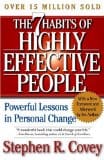 The 7 Habits of Highly Effective People by Stephen R. Covey has become one of the best selling books in the realm of Personal Development. With over 15 million copies sold, the seven habits (be proactive; begin with the end in mind; put first things first; think win/win; seek first to understand, then to be understood; synergize; and sharpen the saw) have helped many people focus on what’s most important to them. Though not directly pertaining to humor in the workplace, the book does help you understand how to create a sense of work/life balance.
The 7 Habits of Highly Effective People by Stephen R. Covey has become one of the best selling books in the realm of Personal Development. With over 15 million copies sold, the seven habits (be proactive; begin with the end in mind; put first things first; think win/win; seek first to understand, then to be understood; synergize; and sharpen the saw) have helped many people focus on what’s most important to them. Though not directly pertaining to humor in the workplace, the book does help you understand how to create a sense of work/life balance.
Stephen R. Covey gives us The 7 Habits of Highly Effective People. Well I give you 7 Things I Learned from 7 Habits (that aren’t just the 7 habits). If you can, try to read this post in 7 minutes, then share it with 7 friends and drink a 7-up.
1. “To know and not to do is really not to know.”
Knowledge is useless until you act on it. It’s not enough to know something, you have to turn that knowledge into action.
2. “We are responsible for our own lives.”
What a scary thought, huh? We are the ones responsible for how our lives turn out, we determine what we do and how we act, so why not make it more fun and exciting?
3. “It is possible to be busy–very busy–without being very effective.”
Or as Peter Drucker said in The Effective Executive: “Efficiency is doing things right; effectiveness is doing the right things.” We need to be effective.
4. “If both people aren’t winning, both are losing.”
In improv this is known as “Yes And,” but it applies in business as well. When you work to make sure that both sides win in any arrangement, you not only have the short-term victory, but you’re also setting yourself up for success in the future.
5. “When you listen, you learn.”
The key to effective communication is not telling people everything that you know, but everything that they need to hear. And the only way to know what they need is to listen.
6. “The whole is greater than the sum of its parts.”
Mathematically this isn’t true, but in terms of productivity and effectiveness it certainly is. We can accomplish more together than we ever could separately, after all H.E. Luccock quipped “No one can whistle a symphony. It takes an orchestra to play it.”
7. “The greatest asset you have [is] you.”
At the end of day–actually during the entire day, and night too, all you have and can control is you. Your ability to be effective rests on you. Taking the time to improve your skills, maintain your health, keep your sanity, and “sharpen the saw” will help in all other aspects of work and life. Luckily for us, humor can provide many of those benefits.
For more, check out our other Recommended Reading.
